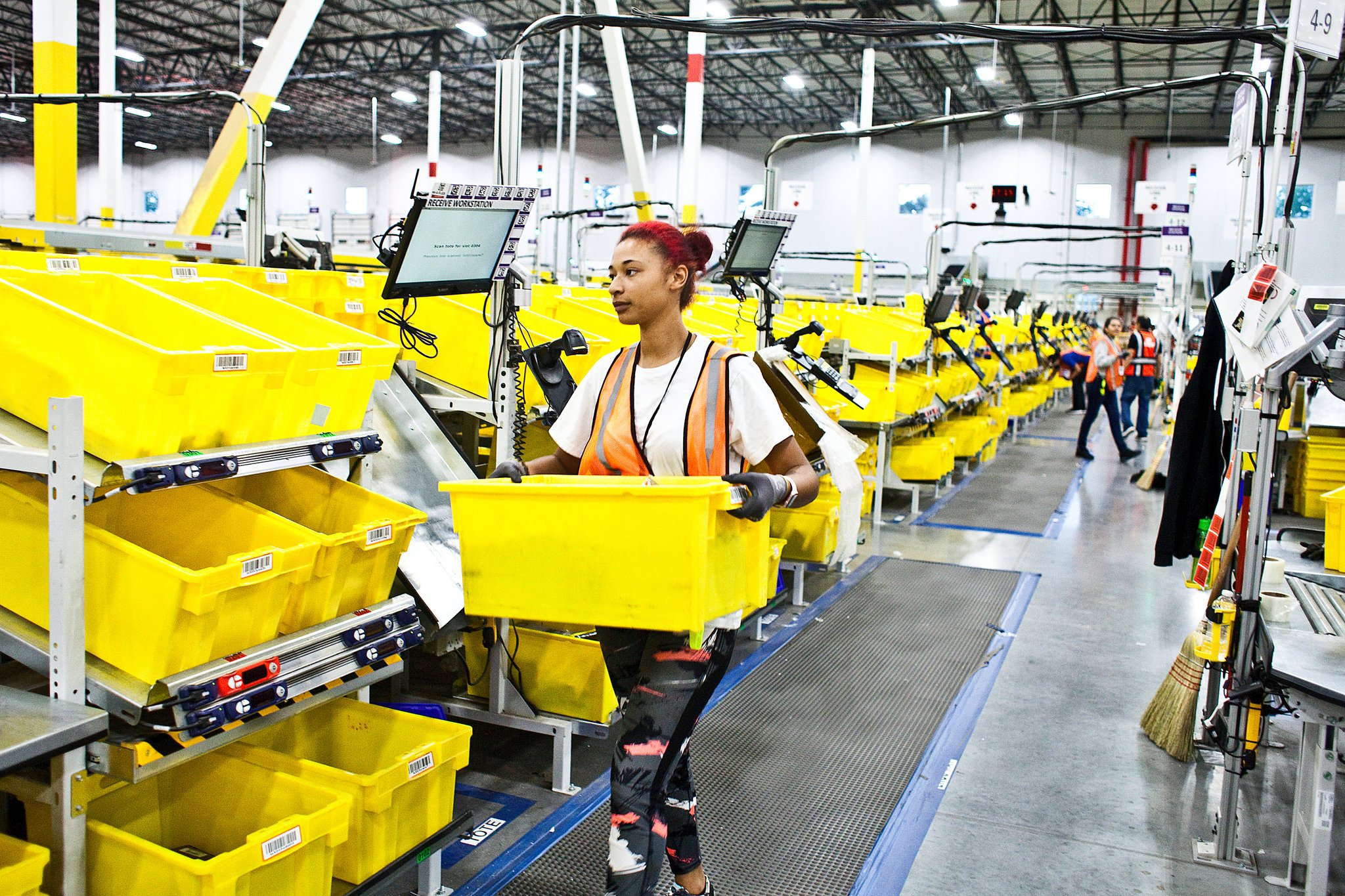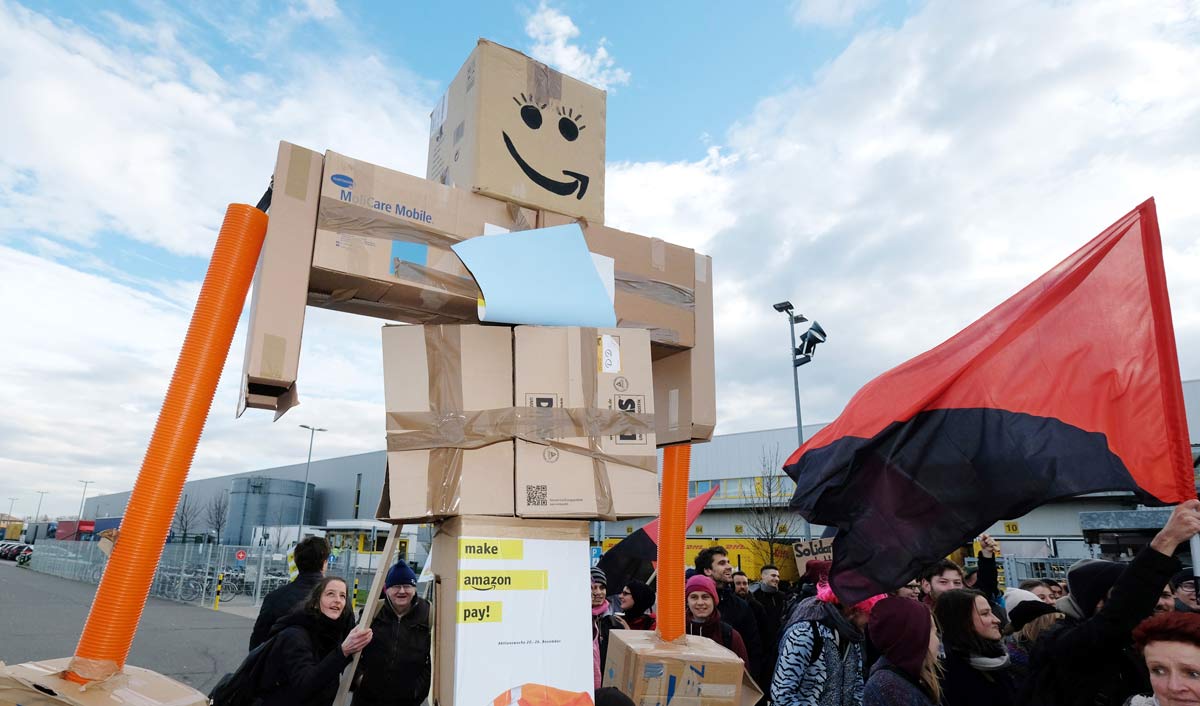“Seasonal Associate,” The Human Cost of Amazon
People die “mysteriously” working at Amazon. There are too many news stories documenting workers “suddenly” getting sick. I use quotes because it doesn’t take a detective to figure out what’s going on. When you click “deliver in the next 5 to 7 business days,” you enable and sanction a class of indentured employees tasked with strenuous labor, without health insurance or paid time off. As consumers, we are all implicated, but the heaviest burden lies on the company for facilitating such an exploitative and expropriative structure and on the American nation-state which has created this economic reality with lax corporate laws, a vision that spoon feeds us the delusion of trickle-down economics.

I worked at an Amazon fulfillment center in Austin, Texas, and Heike Geissler, the author of Seasonal Associate (Semiotext(e)/Native Agents, 2018), worked at another facility in Leipzig, East Germany. In her book, Geissler, a freelance writer from Leipzig, first starts working for Amazon when she’s in between jobs in the literary industry and looking for a temp job to tide her over. The memoir examines her time there while implicating you, the reader. The book joins earlier efforts to expose the e-commerce giant like Vanessa Veselka’s “In the Wake of Protest: One Woman’s Attempt to Unionize Amazon” (2011) and James Bloodworth’s Hired: Six Months Undercover in Low-wage Britain (2018). There have been other explorations that take a more poetic approach, like Of the Subcontract (2013) by Nick Thurston, which compiles poems written by underpaid subcontracted workers commissioned through Amazon’s Mechanical Turk service. Before I started working at Amazon—a job I took this summer in a similar position as Geissler, because I needed the money to tide me over financially between grad programs—I explored the corporation’s demands on its workers in a performance called To Be A Box (2018), where I played an embodied Amazon box being interviewed. In December, as a part of Alienated Labor, an upcoming exhibition at Ori Gallery in Portland, I will debut Abra (2018), a video installation of an interview I conduct with Peccy, Amazon’s customer service obsessed mascot.
Geissler’s metacognitive text, Seasonal Associate, is a meditation on labor, the axis of consumerism, and the exhaustive and transformative force of time. Throughout the book, Geissler highlights the obfuscation and lack of information that consumers are fed. Amazon offers little about a good’s production and shipping cycle. All consumers receive is a box with a literal smile on it with two addresses, sender and receiver. Erasure overrides production as consumption overrides environmentalism.
Those who quip, “Well, buying from and working at Amazon is voluntary, if you don’t like Amazon, simply buy from and work somewhere else,” are ignoring the fact that a lot of times Amazon is the only provider of both jobs and necessities, especially in peripheral regions. “Necessities,” however, is still a relative term. “You usually pretend to need the things you want,” writes Geissler near the book’s beginning, underscoring how algorithmic marketing structures our desires. Big data enables hallowed consumption mobilized through Jeff Bezos’s “ingenuity,” or more accurately, predatory extraction harnessed through data sets. Algorithms scan carts and place customers in slots for targeted ads, informed by the binary of race and class, a type of redlining analogous to the system that organized people and neighborhoods to refuse Black and Latinx people mortgages.
Geissler’s tenure at Amazon begins with an orientation led by an overzealous American businessman pointing to the toxic masculinity central to the existence of big corporations. These spaces are full of neoliberalism’s empty promises: “We at Amazon think every day is the first day … take your opportunity … it starts now …” Predatory working conditions are parallel to loan conditions.1 The maxim goes, “take a loan out, get a good education, and pay it back.” Similar is the logic behind how working conditions are framed, “you start at the bottom, work hard, get more money, and rise to the top.” Modern-day corporations are pyramid schemes disguised as upward mobility, where only the ones at the very top extract profitable sums from those at the bottom.
This past summer, protests broke out in Spain, Germany, and Italy around subpar working conditions at Amazon facilities. However, in America, Amazon has a steadfast trajectory of suppressing union organization, even though from 2015 to 2018, through the acquisition of Whole Foods and exploiting the decline of America’s retail industry, Amazon has more than doubled in size. My former facility in Austin was an open-air facility where employees worked in sweltering temperatures. Recently, this past summer, an air-conditioner was installed. Who had to die, suffer, riot, or protest in order to finally make this happen?

In chapter four of Seasonal Associate, Geissler sees her co-worker, Hans-Peter, sick at work but trudging through. I’ve seen many people hobble in pain and I’ve heard stories of people throwing up in the bathroom stalls. Since they can’t afford to miss a day, they are still at work. Instead of figuring out wages that support people’s lives and families and creating a “living wage” for its citizens, the United States has handed off its most vulnerable population to debt, incarceration, and permanent servitude to corporations. And we cannot work fast enough either. Geissler and her coworkers are frequently chided by managers, encouraged to cut corners and work in ways that are unnatural for their bodies. Why be human when you should be a machine? There is no time for errors or time to take care of yourself. You are bad at your job because you don’t work hard enough. You can’t take care of yourself, let alone take care of your family, because you work too hard at your job.
Geissler addresses this lack of care in chapter five while ruminating about a bed full of trash, including “crumpled paper, vodka bottles, condoms, cigarette butts,” and unfamiliar dog toys. She is trash; she is continuously a processor, her body a conduit, the company’s puppet. The aphorism, “you made your bed and now must lie in it” refers to facing up to one’s actions, but in this environment, entrapment of workers is legislated by a lack of policies safeguarding an employer’s wellbeing over that of the vulnerable workers. The workers continue to “face” the consequences of their stolen labor and pilfered income, not the company. According to The Guardian, “In a 2017 corporate filing, Amazon reported that the median salary of its employees is $28,446, or roughly $13.68 an hour for full-time employees. Jeff Bezos makes more than that every nine seconds.”

Throughout her book, Geissler aptly centers the reader with her use of “you.” The resulting hyper-awareness of our bodies is especially palpable in the sixth chapter, which features blatant sexism disguised as lewd jokes aimed at women—“Oh give us a blow job” and “Get her wet, she’s really into you.” These sorts of comments and snide remarks are unfortunate, but standard to what women and queer people experience at work. We need to work so we can pay our bills, but we can’t go to management; there is no trust, guarantee, or reciprocity of safety. Do we choose paying bills or our safety? The will to financially self-preserve our body wins in spite of the psychological toll on our minds.
Geissler’s time at Amazon ends when she arrives to work five minutes late due to unreliable tram service in German winter weather and she gets a quarter of an hour pay docked. This inspires Geissler to walk out of work and never look back. She reflects on more desirable working conditions: “You want workers who are able to report on the conditions of their work, who don’t have to defend themselves and every choice they have ever taken.”
In the current condition, where top-down authoritarian corporate hierarchy is standard, how can a lateral transparent structure exist? Geissler mentions the case of Betty Dukes, a Black woman who was subjected to multiple disciplinary actions by Walmart in 1994 when she called the company’s “Open Door” hotline, “a 1-800 number for internal complaints eventually known among Wal-Mart employees as ‘1-800-YOU’RE FIRED.’” As a worker, someone who is gendered and racialized, you simply cannot file for wrongdoing when the act of filing it is the wrong itself. Kevin Vennemann, in Seasonal Associate’s afterword, states: “Compelled to hawk our labor power to only the cheapest buyers on this new capitalist market, we are forced to distill ourselves and everything we are [our time, energy, labor, power, public and private life, our totalized being] into the commodified reification of labor.” Where no proper recourse exists, whether through the company or government facilitation, workers internalize their exploitation and normalize it in order to survive and see the next light of day.
According to the faulty logic of corporate capitalism, only a chosen few deserve to get rich. However, doesn’t everyone deserve fair compensation, a living wage or salary, and to be part of a culture or environment where they are not just tolerated but respected and appreciated? Death should not be the only guarantee promised to a worker—a decent life should be, too. Far from parroting a critique that hinges on the long term, the creation of a welfare state, or easily exploitable, conscious “Go Green” or “Fair Trade” consumption, I ask you to opt out of consumption cycles you don’t understand. If you don’t know how this product got to your doorstep, it’s not yours to order in the first place. The only way to push the top from below is to connect horizontally. Support your local hardware stores, reuse stores, and grocery stores—the ones not owned by Amazon. We need to demand equity for workers, whether by ballot, protest, or boycott.
Hiba Ali is a new media artist, writer, curator, and musician from Chicago, Illinois, whose work concerns labor and power. Her performances as H1BA sample her immigrant, black, brown, and refugee ancestry. She believes in the power of her ancestors, queerness, and Sufi Islam. She is currently a PhD candidate in Cultural Studies at Queens University, Kingston, Canada. She has presented her work in Chicago, Stockholm, Toronto, New York, Istanbul, Detroit, London, Riga, and Dubai.
NOTES
1. See: Jackie Wang, Carceral Capitalism (South Pasadena: Semiotext(e), 2018) and David Harvey, The New Imperialism (Oxford: Oxford University Press, 2013).